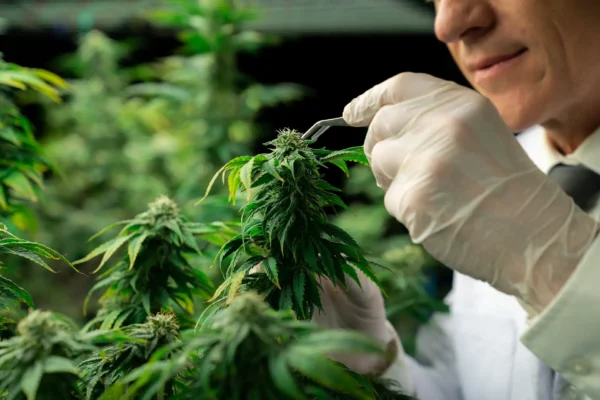Every year, Men’s Health Week serves as a crucial reminder to pause and reflect on the health challenges that many men face – but often don’t talk about. It’s a time to raise awareness of how gender, culture and environment can affect our health, and to open conversations to help men find the support they need.
At Curaleaf Clinic, we know it is important for men to feel heard, supported and informed about their health. This includes everything from routine check-ups and mental wellbeing to long-term conditions like cancer and chronic pain. For some, it also includes exploring treatment options like medical cannabis.
When is Men’s Health Week?
Men’s Health Week happens each year in the week leading up to Father’s Day – between 10-16 June in 2025. It’s a time focused on giving men the tools, confidence, and motivation to prioritise their health[1].
This week encourages men to take control of their physical, mental, and emotional wellbeing. It also helps families and communities learn how to support the men in their lives. At its core, it’s about breaking down stigma and promoting a more open culture around health, where asking for help is a strength, not a weakness.
Why Men’s Health Needs Attention
Men in the UK face poorer health outcomes in many areas of life. One in five men die before reaching the age of 65[2].These figures reflect a broader mix of social, economic, biological, and cultural factors that can make it harder for men to get the care, information, and support they need. Many of these factors are outside of an individual’s control.
Men are at increased risk of:
* Heart problems
* Lung and prostate cancer
* Liver problems
* Accidental injury
* Death due to untreated conditions [3]
Often, men don’t see healthcare professionals as regularly as women. This can mean they are less likely to get help when they need it. There can also be a societal expectation for men to appear strong and independent, which can make it harder to ask for support. In areas where there is more poverty and unemployment, the risks are even higher, and men in the poorest communities tend to live significantly shorter lives[4].
In this context, early symptoms of physical or mental health issues can be easy to miss and knowing how to respond isn’t always clear.
Understanding Men’s Experiences with Chronic Pain
At Curaleaf Clinic, we took to the streets with Mesha Moinirad to speak with men about their experience with chronic pain. In this short video, men reflect on how chronic pain affects their lives and discuss the importance of speaking openly about it.
The Biggest Risks to Men’s Health
Many of the health problems that affect men today can be prevented or managed effectively if they are found early. But stigma, low awareness, and a reluctance to seek help often get in the way. The biggest risks to men’s health – mental health difficulties and cancer – are complex, but with the right support, outcomes can improve.
Men’s Mental Health
Mental health is one of the most pressing yet overlooked issues affecting men today. Around one in eight men in England live with a diagnosable mental health disorder, but many never receive treatment[5].
- Men aged 45-49 have the highest suicide rate of any demographic in the UK, at 25.3 per 100,000 people[6].
- Three in four suicides are by men.
- Despite this, men make up only a third of referrals to NHS talking therapy services.
Work stress, financial pressures, and relationship breakdowns are often contributing factors. The stigma around discussing emotions can make it harder for men to reach out and harder still for support systems to respond effectively.
There’s plenty of support out there, and it’s important to remember that help is available – whether through your GP, locally available talking therapies, or a private therapist. Opening up is the first step to getting the right care. That is why at Curaleaf Clinic we have partnered with Better Help to give our patients the opportunity to access one month free of talking therapy.
For men living with conditions like anxiety, depression, or PTSD, medical cannabis may be an option where other treatments haven’t helped. Our clinicians work closely with patients to assess whether medical cannabis could form part of a broader mental health care plan.
Cancer
Men are also at higher risk of several types of cancer, particularly:
- Prostate cancer
- Testicular cancer
- Bowel cancer
- Lung cancer
Finding cancer early is an important component of improving the chances of successful treatment. However, men are more likely to delay GP visits, miss routine screenings, or minimise new symptoms. This delay can make treatments less effective and lower the chances of survival.
For men undergoing treatment or living with cancer, medical cannabis is increasingly being explored as a way to manage symptoms and ease the side effects of certain treatments. While medical cannabis is not a treatment for cancer itself, it may be appropriate for some patients with cancer-related appetite loss, pain, chemotherapy-induced nausea and vomiting (CINV) and those receiving palliative care.
What Can You Do for Men’s Health Week?
Men’s Health Week is a reminder that small actions can make a big difference. Whether it’s checking in with yourself or reaching out to someone else, what you do matters.
Here are a few things you can do:
- Book a GP appointment for any symptoms or worries you’ve been putting off
- Start a conversation with the men in your life – ask how they’re really doing
- Encourage workplace or local health initiatives that focus on men’s wellbeing
- Share trusted resources on mental health and chronic conditions
- Mind – A mental health charity providing information, support, and guidance on mental health conditions and services
- Men’s Health Forum – Offers health information specifically for men, including a section on mental health
- Pain Concern – A charity offering information and support for people with pain and those who care for them
- If conventional treatments haven’t worked for you, medical cannabis may be considered for symptoms like chronic pain, stress, or sleep disturbance
Men’s Health Week is more than a calendar event – it’s a chance to reflect, reframe, and reset how we talk about and manage men’s health. From physical conditions like cancer and heart disease, to the quieter but equally serious struggles with mental health, every man deserves to be seen, supported, and cared for.
At Curaleaf Clinic, we support men living with a range of chronic conditions, including anxiety, depression, and pain-related disorders. If you’re looking to explore whether medical cannabis could be part of your care plan, our clinical team is here to help.
What to Do in a Mental Health Crisis
If you or someone you know is experiencing a mental health crisis, it’s important to get help immediately. Here are some steps you can take:
- Contact emergency services: If you feel your life or someone else’s is in immediate danger, call 999 for emergency services.
- Go to your nearest A&E (Accident and Emergency) department: Hospital emergency departments can provide immediate help for mental health crises.
- Call the NHS 111 service: In England, Scotland, and Wales, you can call 111 for urgent mental health support. They can provide advice and direct you to the appropriate services.
- Contact a crisis hotline: Several organisations offer confidential support:
- Samaritans: Call 116 123 (free from any phone).
- Shout: Text “SHOUT” to 85258 (a free, confidential text messaging support service).
- CALM (Campaign Against Living Miserably): Call 0800 58 58 58
- Contact your GP as soon as possible: If it’s not an immediate crisis, your GP can provide support and refer you to appropriate mental health services.
- Reach out to a trusted friend or family member: Talking to someone you trust can provide emotional support during a difficult time.
Remember, you are not alone, and help is available. Don’t hesitate to reach out if you need support.
[1] Awareness Days. (2024). Men’s Health Week 2025. [online] Available at: https://www.awarenessdays.com/awareness-days-calendar/mens-health-week-2025/.
[2] Menshealthforum.org.uk. (2014). Men’s Health Manifesto. [online] Available at: https://www.menshealthforum.org.uk/mens-health-manifesto.
[3] Triggle, N. (2025). Why men are so unhealthy – and what can be done. BBC News. [online] 6 Apr. Available at: https://www.bbc.co.uk/news/articles/clywrl5460jo.
[4] Triggle, N. (2025). Why men are so unhealthy – and what can be done. BBC News. [online] 6 Apr. Available at: https://www.bbc.co.uk/news/articles/clywrl5460jo.
[5] NHS Digital (n.d.). Data. [online] NHS Digital. Available at: https://digital.nhs.uk/data.
[6] Samaritans (2023). Latest suicide data. [online] Samaritans. Available at: https://www.samaritans.org/about-samaritans/research-policy/suicide-facts-and-figures/latest-suicide-data/.



